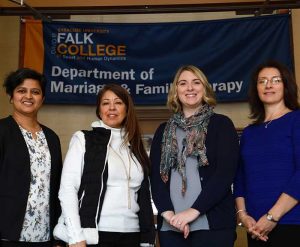By Richard J Chang, Asst. Digital Editor, Daily Orange.

Gangamma, an associate professor in Syracuse University’s Marriage and Family Therapy department, oversees the refugee mental health program. The Ph.D. program is now offering greater clinical services to better communicate with local refugee families, focusing on the effects displacement can have on mental health.
“In Syracuse, there are a lot of programs that provide resources, but what I found there is a lot of strength in building collaborative efforts rather than each person doing their own thing,” Gangamma said.
About 10,000 refugees settled in Onondaga County in the last decade. A 2018 study of mental health disorders in refugees found “a substantial lack of data,” on the full extent of psychiatric disorders within these communities, but stated there is an “urgent need” for intervention services.
Students in the Ph.D. program provide therapy to Syracuse residents for a year. The original intent of SU’s program was to make mental health resources available to refugees, but it has since evolved to focus on training students and language interpreters to provide effective treatment, Gangamma said.
The department realized in fall 2019 that there was a need for interpreters who had medical training in addition to an understanding of the spoken languages and experiences of refugees who experience mental health issues, said Tracey Reichert Schimpff, director of clinical services for SU Marriage and Family Therapy.
Gangamma created a training program for therapists and interpreters to more effectively bridge the gap between medical and cultural knowledge, she said. Therapists in the program are now able to communicate with refugees about mental health, she said.
The department is also developing a program to train future clinicians about how to engage in discussions with refugees about mental health in more sensitive and appropriate ways, Reichert Schimpff said.
Seeking support for mental health is institutionalized in western countries, but may be looked down upon within the cultures some refugees come from, Gangamma and Reichert Schimpff said.
The biggest difficulty with offering mental health services to refugee families is establishing trust, Reichert Schimpff said. Students in research universities tend to leave after a few years, which makes it hard to establish connections with patients, she said.
“Certain populations and certain people who have multiple challenges might not think of therapy being an option, whether culturally, in their family or just in terms of safety and being recognized,” Reichert Schimpff said.
Resettlement agencies help refugees find employment in Syracuse and develop language skills within the first 90 days after arrival. Housing often becomes the first conflict for refugees after moving to the area, Reichert Schimpff said.
Some refugees also struggle to adjust to changes in their economic and social statuses, Gangamma said. Finding suitable jobs and a place to live can be challenging, she said.
“There are these post-migration factors related to poverty and underemployment,” Gangamma said. “Some of them, when they are resettled to a place like Syracuse, they are often put in places where poverty levels are really high or neighborhood factors are not entirely favorable.”
SU Marriage and Family Therapy sends student therapists to different locations to educate refugee families and provide therapy. Gangamma sent students to interview farmers who are part of the Syracuse Refugee Agriculture Partnership Program, which provides refugees with agricultural training and education.
The students used the interviews to compare the experiences of refugees who are not in the program and to analyze how farming affects their mental health, Gangamma said.
Marriage and Family Therapy also partnered with PEACE, Inc., a Syracuse organization that aims to help residents become self-sufficient, to collaborate on mental health services, offer translation services and find medical interpreters.
The partnership provided SU with a site close to the city’s refugee communities to send student therapists, said Maria Taddeo, a coordinator for PEACE Inc.’s Head Start program, which provides childhood development and family services.
Finding refugees and admitting them into Head Start programs was easy, but trying to communicate with families to provide support was complicated due to the costs associated with hiring interpreters, Taddeo said.
Head Start surveyed the needs of communities throughout Onondaga County and became aware of the educational, economic and health concerns among Syracuse’s refugee population, Taddeo said.
“We see a lot of family needs that go unserved because we don’t have the capacity to do that,” Taddeo said. “There might be children that are diagnosed with disabilities or going undiagnosed for the lack of communication effectively through the English language.”
Taddeo said that a lack of knowledge of American culture and persisting language barriers contribute to the stress refugee families go through. It is more difficult to teach an adult English as a second language than it is to teach children, which often elevates stress, she said.
The problem is not lacking mental health awareness, but rather the ability of mental health service providers to communicate with and reach refugee communities, Gangamma said. Going into the field and finding firsthand what the community’s needs are has been the focus of SU’s program, she said.
“If you don’t have training for therapists to work with refugees, you can’t build an intervention,” Gangamma said.
This article was originally published at the Daily Orange on February 12, 2020 at 11:37 pm. Read the original article.
